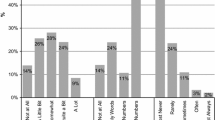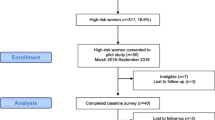Abstract
Background. Many oncologists consult the Adjuvant! prognostic model to communicate risk with breast cancer patients; however, little is known about how effective that communication is. Methods. The authors analyzed this small data set featuring 20 breast cancer patients’ risk estimates, focusing on rankings or gist of the estimates. Results. Overall, there was no gain in the accuracy of patient rankings. The number of patients with more accurate estimates was matched by the number of patients with less accurate estimates after consultation, Conclusions. The current methods used by oncologists to present Adjuvant! risks were not effective in helping patients to get the gist of their risks.
Similar content being viewed by others
References
Ravdin PM, Siminoff LA, Davis GJ, et al. Computer program to assist in making decisions about adjuvant therapy for women with early breast cancer. J Clin Oncol. 2001;19:980–991.
Olivotto IA, Bajdik CD, Ravdin PM, et al. Population-based validation of the prognostic model adjuvant! For early breast cancer. J Clin Oncol. 2005;23:2716–2725.
Love N. Management of breast cancer in the adjuvant and metastatic settings. Patterns Care Med Oncol. 2005;2:10–24.
Peele PB, Siminoff LA, Xu Y, et al. Decreased use of adjuvant breast cancer therapy in a randomized controlled trial of a decision aid with individualized risk information. Med Decis Making. 2005;25:301–307.
Brainerd CJ, Reyna VF. Gist is the grist: fuzzy-trace theory and the new intuitionism. Dev Rev. 1990;10:3–47.
Reyna VF, Brainerd CJ. Fuzzy-trace theory: an interim synthesis. Learn Indiv Diff. 1995;7:1–75.
Hegel MT, Moore CP, Collins ED, et al. Distress, psychiatric syndromes, and impairment of function in women with newly diagnosed breast cancer. Cancer. 2006;107:2924–2931.
Ahles TA, Saykin AJ, McDonald BC, et al. Cognitive function in breast cancer patients prior to adjuvant treatment. Breast Cancer Res Treat. 2007;110:143–152.
Rugo HS, Ahles T. The impact of adjuvant therapy for breast cancer on cognitive function: Current evidence and directions for research. Semin Oncol. 2003;30:749–762.
Lloyd A, Hayes P, Bell PR, et al. The role of risk and benefit perception in informed consent for surgery. Med Decis Making. 2001;21:141–149.
Belkora JK, Rugo HS, Moore DH, et al. Oncologist use of the adjuvant! Model for risk communication: a pilot study examining patient knowledge of 10-year prognosis. BMC Cancer; 2009;9:27. [Epub ahead of print]
McNemar Q. Note on the sampling error of the difference between correlated proportions or percentages. Psychometrika. 1947;12:153–157.
Reyna VF, Adam MB. Fuzzy-trace theory, risk communication, and product labeling in sexually transmitted diseases. Risk Anal. 2003; 23:325–342.
Gattellari M, Butow PN, Tattersall MH, et al. Misunderstanding in cancer patients: why shoot the messenger? Ann Oncol. 1999; 10:39–46.
Ravdin PM, Siminoff IA, Harvey JA. Survey of breast cancer patients concerning their knowledge and expectations of adjuvant therapy. J Clin Oncol. 1998;16:515–521.
Epstein RM, Alper BS, Quill TE. Communicating evidence for participatory decision making. JAMA. 2004;291:2359–2366.
Author information
Authors and Affiliations
Corresponding author
Additional information
The primary study was funded by the Department of Defense, grant DAMD17-96-1-6260. Funding sources for this secondary analysis included the Department of Defense, DAMD17-96-1-6260, as well the National Institutes of Health (NIH) Office of Research on Women’s Health (ORWH) and National Institute of Child Health and Human Development (Grant 9K12HD052163-06). None of the funders had any involvement in the design, conduct, or reporting of this research.
Rights and permissions
About this article
Cite this article
Hutton, D.W., Belkora, J.K., Shachter, R.D. et al. Are patients getting the “gist” in risk communication? Patient understanding of prognosis in breast cancer treatment. J Canc Educ 24, 194–199 (2009). https://doi.org/10.1080/08858190902876452
Issue Date:
DOI: https://doi.org/10.1080/08858190902876452




